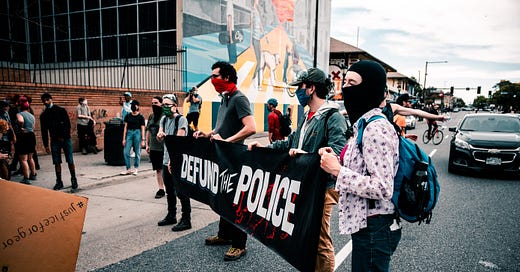“People Not Profits.” “Medicare for All.” “Student Loan Forgiveness.” Pleasant-sounding slogans regularly issue forth from political candidates and the media. But what do these soundbites really mean? Are they as well-intentioned and caring as they seem? And what are the actual results after they’re put into practice?
Unfortunately, the consequences of the policies are often the opposite of the pleasant-sounding slogans. Here are some recent slogans and a brief summary of the well-documented outcomes when they’re enacted.
Defund the Police. Defunding the police results in defunding law enforcement and public safety. Consequently, crime has risen dramatically in the past two years in cities that have cut police funding. In contrast, cities that support the rule of law have lower crime rates. For example, New York City greatly reduced the city’s crime rate in the 1990s and 2000s as the result of “broken windows” policing policies. When these proactive measures were stopped, crime came roaring back to the high level seen today.
Student Loan Forgiveness. This slogan has resulted in a policy that does not cancel student debt. It only transfers the debt from the students to taxpayers. Those who have paid off their loans or haven’t gone to college must now pay off the loans of the beneficiaries of the supposedly cancelled debt. The policy also provides no accountability for universities that keep raising tuition, making college less affordable for the majority of Americans.
Affordable Housing. Implementation of rent control laws leads to low-income housing shortages. Why is this? Rent-controlled housing units are not profitable for landlords. They cannot afford to keep them up and all too often are forced to abandon them. Additionally, cities with “affordable housing” laws often have a surplus of luxury apartments and a shortage of low- and medium-income apartments. An increased number of luxury apartments are built to offset the loss of profits from the affordable housing units. The results of so-called “affordable housing” laws are to make housing less, not more, affordable.
Drug Price Negotiations. This is a euphemism for drug price controls mandated by the federal government. Negotiation isn’t an option when refusing the government’s offer is punishable with higher taxes or fines. Historically, drug price controls lead to shortages of the price-controlled drugs and higher prices for many of the other drugs.
Medicare for All. Often referred to as “universal healthcare,” the predictable result of socialized medicine in nations around the world is healthcare rationing and shortages. The quality of care also suffers when the needs of the government are prioritized over the needs of the patient. Under socialized medicine the decisions are made by unelected central-planning bureaucrats instead of by the patients themselves who will directly feel the consequences.
Voter suppression. Also known as “Jim Crow 2.0,” this slogan really means “I do not support enforcing voting laws.” It’s used by officials and activists who oppose states that make legitimate and constitutional improvements in election integrity laws. Those who push this grievance apparently want everyone in the world to vote in U.S. elections as many times as they would like. But the votes of legal voters are neutralized by illegal voters when election laws are not enforced. The slogan’s actual effect is to suppress legal voters and enable illegal voters—something most Americans oppose.
Inflation Reduction Act. This recently passed bill, which is also a slogan, will not reduce inflation. Quite the opposite. It will likely increase short-term and long-term inflation, lower household incomes, devalue Americans’ lifetime savings and add to the federal deficit. Excess government spending and a soaring federal deficit are inflationary. As a report from the Heritage Foundation concludes, “The bill is about as far away from a genuine Inflation Reduction Act as possible.”
The Bottom Line: Ignore the slogans. Look for the policies and think about how they would be implemented in real life.




"Zero" is like "perfect." In reality, you will never get there. Oftentimes, not even close.
I'll add: Anything with "zero"
COVID Zero
Net Zero Emissions
Vision Zero.